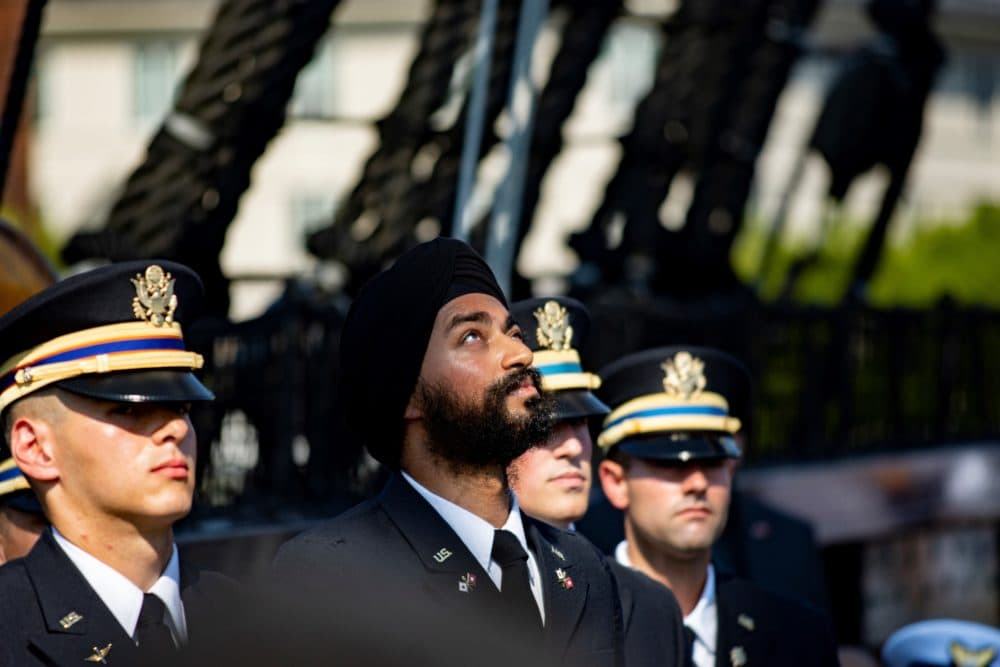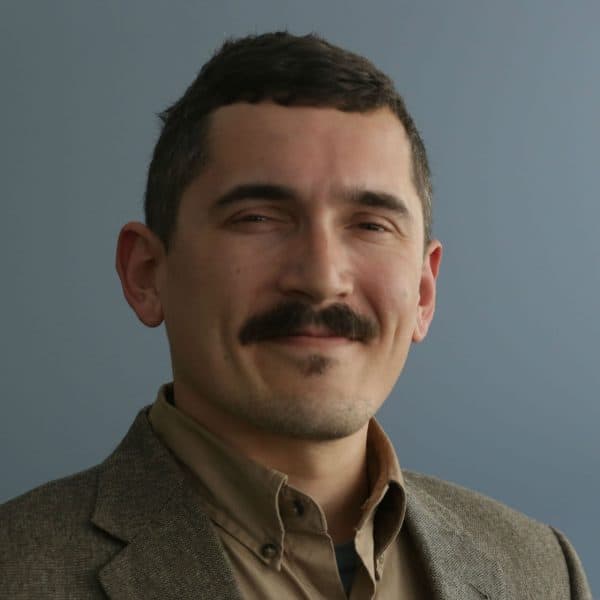Advertisement
Sikh Man Paves Way To Serve Country While Staying True To Faith
Resume
In 2017, WBUR told the story of a member of the Sikh faith and his long struggle to join the Massachusetts National Guard. Now he's 2nd Lt. Kanwar Singh.
Of the 31 people who showed up to Officer Candidate School in March, only 19 would make it through to the end.
The path wasn’t easy for anybody, but it was especially hard for the guy who’s 6-foot-2, has a big black beard, and wears his hair in a turban.
Kanwar Singh says it was always about more than just himself — it was about the wider Sikh community — and that helped push him through the years of uncertainty about whether he’d even get in to the military.
"Whenever I was down or I wasn’t having a good day, I would go back to the fact that I had to be at my peak performance because I represented the full community," Singh said. "And reintegrating the military was an important goal for us so we had to make sure we made it happen. Certainly there is a burden that comes with that, but I’m happy to be in that position, thanks to God, being able to pull through when you're in tough situations."
For centuries, Sikhs have served in the armies of the world; in fact the martial tradition is a hallmark of their religion. Singh’s grandfather and great-grandfather served in the British Royal Army, and they were allowed to wear beards and turbans.
As an observant Sikh, the 28-year-old Singh wanted to serve in the U.S. military, and stay true to his faith while doing it. But the military wouldn’t allow it.
With the help of the nonprofit Sikh Coalition, Singh sued the Defense Department, and within days officials backed down and granted him a temporary religious accommodation. It took him four years to graduate from Officer Candidate School — something most of his peers did in half the time.
“Generally speaking, if you want to become a second lieutenant, it might only take you about two years or so in the program I was in," Singh said. "But it took me longer just because of the fact that we had to take a religious accommodation, which took a really long time. Then I had to go to basic training and still I had to apply to get the religious accommodation made permanent, so there was a whole bunch of hurdles I had to cross over and over to make it this far."
"I grew because of my relationship with Singh, I learned ... that love of one’s country and patriotism is far more important than appearance and uniformity."
Christian Paluk
Change can come slowly in the military, and sometimes it takes a spark. For Maj. Christian Paluk, head of the Massachusetts Army National Guard Officer Candidate School, the spark was Kanwar Singh.
"I met Singh and I heard his backstory of how passionate he was and how long his journey was to actually get to this point," Paluk said. "It blew my mind that he was this passionate, this patriotic for this country. And I grew because of my relationship with Singh, I learned ... that love of one’s country and patriotism is far more important than appearance and uniformity."
Paluk said it makes sense to have somebody like Singh in the military — mostly because he’s good at what he does — but also because Singh speaks several languages and represents a different part of American culture.
"I think the backbone of the United States has been the military ... people from other nations, other religions, I think that’s the marrow of the bone," he said. "That’s important and it’s vital to our survival, both militarily and as a country, and I think when we go overseas it shows that we kind of practice what we preach in our own country."
"It sinks in when you take the oath of office, the federal and the state, what the responsibilities are and what lies ahead."
Kanwar Singh
Singh says he’s the first Sikh to become a commissioned officer in the Massachusetts National Guard — and possibly the sole Sikh currently serving. And now that he’s made it through Officer Candidate School, he’s ready for the real work to begin: "It sinks in when you take the oath of office, the federal and the state, what the responsibilities are and what lies ahead, to lead soldiers, men and women, into combat, or any humanitarian missions as needed.”
In January 2017, the Pentagon began allowing religious accommodations for aspiring soldiers with beards and turbans.
Singh sees himself as part of a civil rights struggle that helped usher in that policy. Now he hopes more young American Sikhs will take advantage of the privilege he helped secure: to serve their country, and to do it wearing a turban and a beard.
This segment aired on August 7, 2018.
